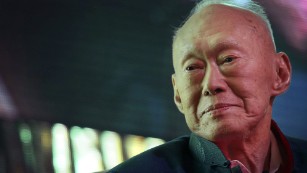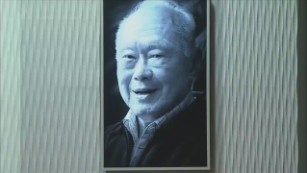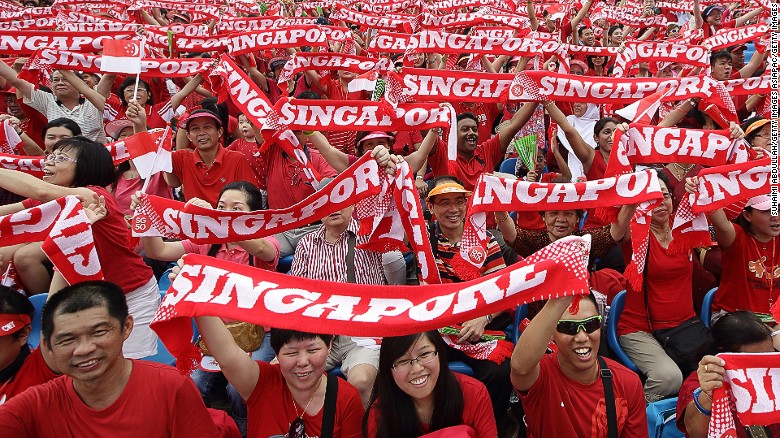Can the Singapore success story last another 50 years?
For a tiny country with few natural resources, the Republic of Singapore is an exceptional success story.
On its 50th anniversary, the city-state certainly has much to celebrate.
It's the world's fourth-largest financial center; operates one of the busiest container ports in the world; and it's the only Asian country to have a AAA credit rating from Standard & Poor's, Moody's and Fitch Ratings.
In just half a century, Singaporeans have become some of the wealthiest people in the world with the highest number of millionaires per capita in Asia.
It's also one of the world's most livable cities -- rated as the greenest in Asia, despite having around 5.5 million people living in an area of just 750 square kilometers (289 square miles). And it's the only country to incorporate green building requirements into its legislation.
Where to from here?
With the death earlier this year of Singapore's revered founder and former Prime Minister Lee Kuan Yew, who guided the nation to economic success, it's inevitable the next half-century will see economic and political change.
The question is how significant this change will be.
Economic challenges
Daniel Martin, Singapore-based Senior Asia Economist with Capital Economics, says change is already happening.

Lee Kuan Yew: building a nation from the ground up
"Last year's GDP was 2.9%. The average for the past 50 years was 7.5%. In fact, it's been more than 5% for the past decade, so it's been quite a big slow down," he told CNN.
"For the past 50 years, Singapore has experienced catch-up growth. The population was increasing at a rapid rate through immigration and a lot of that immigration was highly skilled. Now, Singapore is one of the most developed economies in the world.
"In the future, Singapore isn't going to be seen as a trail blazing 'Tiger' economy -- it's going to grow at a developed world pace of 2.5 to 3% and the challenge is the population is no longer seeing the standard of living rising at such a rapid rate."
Political change
The People's Action Party dominates politics in Singapore.
It has won every election since self-government began in 1959 -- six years before the republic was formed -- but this stability shouldn't be viewed as stagnation.

Son: Father 'took us from Third World into the first'
Rahul Sagar, Associate Professor at Singapore's Yale-NUS and the Lee Kuan Yew School of Public Policy and author of The Big Ideas of Lee Kuan Yew says, contrary to Western perceptions, political change is a constant in Singapore.
"Singapore is constantly changing its policies as it innovates and adapts to a changing world," he told CNN.
"Singapore's political leadership is constantly being refreshed by a highly effective talent management system. These forces have generated changes that have made Singapore very different from what it was in the 1970s. It is a more liberal, permissive, and cosmopolitan place today. Lee Kuan Yew embraced such change -- 'do what works' was his motto."
Quiet revolution?
Looking ahead, Sagar believes Singapore is in the midst of a "Quiet Revolution."
"For the past half century, the state was in charge, and it behaved responsibly, taking Singapore from the Third World to First World. Now the balance of power has slowly but surely begun to shift," he said.
"Singapore's leadership continues to be exceptionally talented and motivated but its hands are bound more tightly now by the wishes of ordinary Singaporeans. Going forward, much will depend on the willingness of Singaporeans to behave responsibly. If they succumb to populism, Lee Kuan Yew will not be there to save them from themselves."
Press freedom and social media
The willingness of Singaporeans to "behave themselves" as Sagar put it, can also be viewed in the context of press freedom.
The 2015 World Press Freedom Index -- compiled by Paris-based Reporters Without Borders -- ranks Singapore 153 out of 180 countries around the world -- just below the Russian Federation and just above Libya. In fact, it's slipped three places since 2014.

Changing lifestyles with smartphone data
While local mainstream media remains tightly controlled, the inevitable rise of social media means Singaporeans are increasing able to voice their opinions.
Martin says Singaporeans are very active on social media. He cities the social media outcry over government plans to increase migration to boost growth as one example of citizen outrage that changed political policy.
"Over the next 50 years, the government won't be able to deliver guaranteed increases in living standards and this is happening at a time when the government no longer has such a strong hold over media," he said.
Emotion vs pragmatism
According to Sagar, the greatest challenge Singapore's leaders face is whether to continue to take a pragmatic approach to governance.
"Will policies continue to be judged on how effectively they contribute to growth and development or will they be judged on more emotive grounds?" he asked.

Things Singapore does better than anywhere else
"An assertive new class of critics has appeared on the scene, relying on Facebook to disseminate critiques on topics such as immigration, inequality, and race. Some of these are carefully reasoned and have prompted changes or responses from policy makers.
"But some of the loudest voices belong to the hotheaded and the cocksure. If these voices sway public opinion -- as they have over the issue of immigration -- then an increasingly liberal and democratic Singapore will sadly become ever less likely to pursue wise and prudent policies."
Linking East and West
Even as a developed nation, Singapore continues to offer a competitive advantage for business that few others in the region can offer, including low corporate tax rates, infrastructure and transparency.
Martin believes Singapore's importance as a bridge between countries and cultures can only grow in the future.
"It is in a valuable position as a bridge between the West and China. It's a great place to be based, and it has good relationships with China. In addition, the level of Mandarin has increased in past 30 years," he said.
News Courtesy: www.cnn.com











